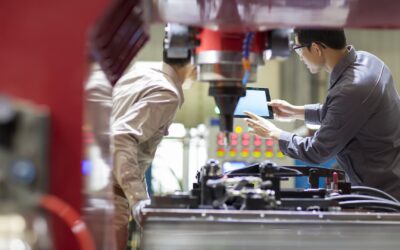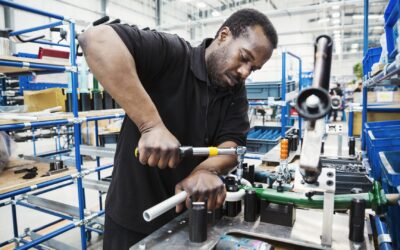Top 3 Uses for Big Data in Manufacturing
How can collecting data positively impact the manufacturing industry? The rise of sensors and connected devices focused on monitoring and reporting factory floor activities has created more potential than ever to modernize manufacturing and increase productivity. There are many ways to implement these new technologies, whether that means retrofitting older machines to report information to the cloud for easy access or investing in new equipment. It all depends on what you hope to gain from collecting the data. Below are three important uses for Big Data in manufacturing.
Predictive Maintenance
Data collection and analysis can assist manufacturers in understanding when machines may need to be replaced or serviced. By monitoring the type of machine, the year it was made, and how long it has been in service, it is possible to predict a machine’s life span and future service times. By avoiding unplanned downtime, manufacturers can also avoid massive production backups and diminished revenue.
Plant Service recently reported on how data analysis was able to help PepsiCo from downtime, lost sales, and extra sanitation steps. The food and beverage giant’s year-to-date equipment downtime is 0.75% and unplanned downtime is 2.88% at its Fayetteville, Tenn., Frito-Lay plant, which produces over 150 million pounds of food per year. By using vibration readings data confirmed by ultrasound, PepsiCo was able to prevent a combustion blower motor from failing and shutting down the entire potato chip department.
Increased Productivity & Optimization
Manufacturers can leverage data to build better products more quickly and with the goal of being more competitive. Data analysis powers continual performance improvements in manufacturing, including increased productivity. When manufacturers have the ability to identify the many variables that affect production, they can improve workflows along the entire supply chain, which will ultimately boost manufacturing organizational efficiency from top to bottom.
Data-driven operations can be used beyond the factory floor as well. Industry 4.0 company Hitachi Vantara, for example, is using its new edge-to-cloud data fabric technology built on its intelligent DataOps platform to help Disney Parks and Resorts with ride and show analytics, according to a recent report in Yahoo! Finance.
“In order to maintain our complex ride systems, we are constantly capturing and ingesting data from multiple touchpoints throughout the ride, striving to optimize efficiency in our systems and continuing to keep the attraction experience as seamless as possible,” said Michael Tschanz, director of Design & Engineering Technology & Analysis at Disney.
Product Customization
Big Data is essential in helping manufacturers uncover new insights that drive innovation. This is especially important as the market now demands more customized products tailored to individual specifications. By collecting and analyzing data on consumer behavior in real time, companies now have the ability to produce customized goods at scale.
In March, Harvard Business Review reported that Home Depot, JPMorgan Chase, Starbucks, and Nike have publicly announced that personalized and seamless experiences are at the core of their corporate strategy.
And companies are getting more and more creative with how they are gathering data. According to the Harvard Business Review report, athletic clothing maker lululemon acquired Mirror in 2020. Mirror streams fitness classes into users’ homes. This enabled lululemon to gain a new view into customers’ behavior. Mirror now gives lululemon insights into customers’ workout routines, data that helps the brand further refine recommendations for future products and services.
Big Data analytics is no longer a nice-to-have in manufacturing, it’s a must-have to stay in business. The companies realizing success in the digital age are those investing in Big Data approaches that will allow them to predict, optimize and innovate like never before.
Sean Healey A long time Industry 4.0 enthusiast, Sean Healey is a graduate of Hawai'i Pacific University and a retired member of the United States Marine Corps. He serves as a Multimedia producer and thought leader within Automation Alley.Nicole KampeNicole Kampe is Manager of Global Content Strategy and Development at Automation Alley and is responsible for content strategy and development as it relates to Automation Alley's brand and image, including Automation Alley’s two signature initiatives: the annual Technology in Industry Report and Integr8, the global Industry 4.0 Conference. Nicole manages Automation Alley’s blog, internal media relations and creates thought leadership opportunities for the organization in the form of white papers and roadmaps in coordination with the World Economic Forum’s global network of Advanced Manufacturing Hubs. Nicole is a graduate of Oakland University and holds a Bachelor of Arts in Journalism. Prior to joining Automation Alley in 2012, Nicole was an award-winning journalist at The Oakland Press where she served as a writer, copyeditor and page designer, and was honored on multiple occasions by the Society of Professional Journalists.




